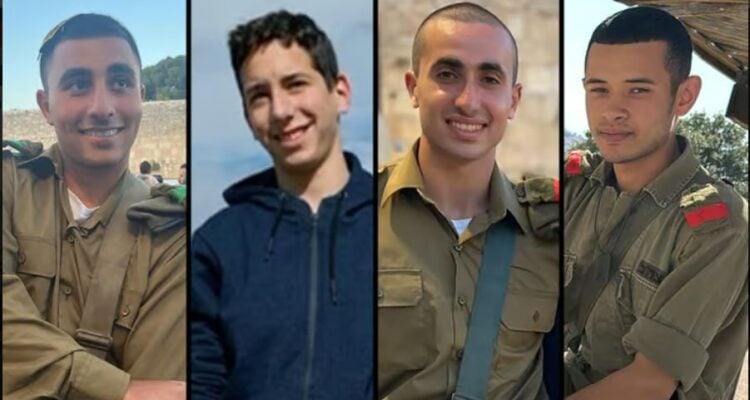Sergeants Yoav Agmon, Alon Amitay, Yousef Hieb and Omri Tamari were all training to be Golani infantry soldiers.
By Batya Jerenberg, World Israel News
The IDF has released for publication the names of the four soldiers killed in Hezbollah’s UAV attack Sunday on their Golani base near Binyamina.
All four were 19-year-old infantry trainees who had just been inducted in August. They were all posthumously promoted to the rank of sergeant.
Agmon was from Binyamina-Givat Ada. The IDF has informed his family of his death and expressed its profound sorrow over his loss.
Amitay came from one of the founding families of an Upper Galilee moshav, Ramot Naftali that was evacuated in the beginning of the war.
According to Israel Hayom, joining Golani was a family tradition Amitay proudly upheld, as many of his uncles enlisted in that venerable brigade. He had made it into the Sayeret, the elite commandos of the brigade, and was at the base because of a rocket-launcher course they were taking, his uncle said.
“He eagerly awaited the draft,” the uncle said. “He wanted to be a combat soldier, and an officer like his mother, like his uncles. An amazing boy…who loved people. A special boy.”
Although she has twin 12-year-old girls at home, his mother, Lieut. Col. Hagit, was called up for reserve duty on October 7 and has yet to be demobbed, serving continuously over the last year as commander of a multidimensional supply base in the Northern Command.
Hieb was from the northern Bedouin town of Tuba-Zanghariya. As reported by Israel National News, he was killed just one week before the 33rd anniversary of his grandfather’s death in Lebanon.
Warrant Officer Nayef Hieb had served for 17 years as an IDF tracker and was killed in 1991 when a roadside bomb exploded as his patrol vehicle passed by.
The clans of Tuba-Zanghariya tied their fate to that of the Jewish people even prior to the state’s establishment, joining the Bedouin unit of the pre-state Palmach forces to fight the British who controlled what was then called Palestine.
Tamari came from Mazkeret Batya, near Rehovot. One of the 58 soldiers wounded in the incident told Walla that Tamari had been a person whose “quietness characterized him. He always volunteered to pick up equipment,” but without fanfare. “He was extremely humble – I have never seen such modesty in a person in my life. He had a pure heart, he never complained in life.”
He was also was “good at everything,” the friend said. “He was in first place in the fitness tests… He was supposed to go to officers’ training in November, he wanted to move forward in life.”
A battle fitness group Tamari had trained with for two and a half years to prepare himself for the army mourned him as “a quiet leader, an introvert, smart, an athlete and principled” who had spent a post-high school year in a volunteering program due to “his love of the country and desire to contribute to it.”





